Can a cat with wild ancestry truly become a child’s best friend? When you think of Savannah Cats and Children, the first question that might come to mind is whether these striking, high-energy felines make for Child-Friendly Savannah Cats in a household with kids. With their unique blend of African Serval lineage and domestic cat traits, Savannahs are known for their strong personalities and dynamic behaviors. So, could these exotic cats turn out to be the Best Pets for Kids, or are their spirited natures a bit too wild for a family setting?
Key Takeaways
- Savannah Cats have a blend of wild and domestic traits.
- Understanding their nature is key for a harmonious family life.
- With proper socialization, they can be engaging companions for children.
- They require an environment that caters to their energetic personalities.
- Potential for strong emotional bonds with family members.
Understanding the Savannah Cat Breed
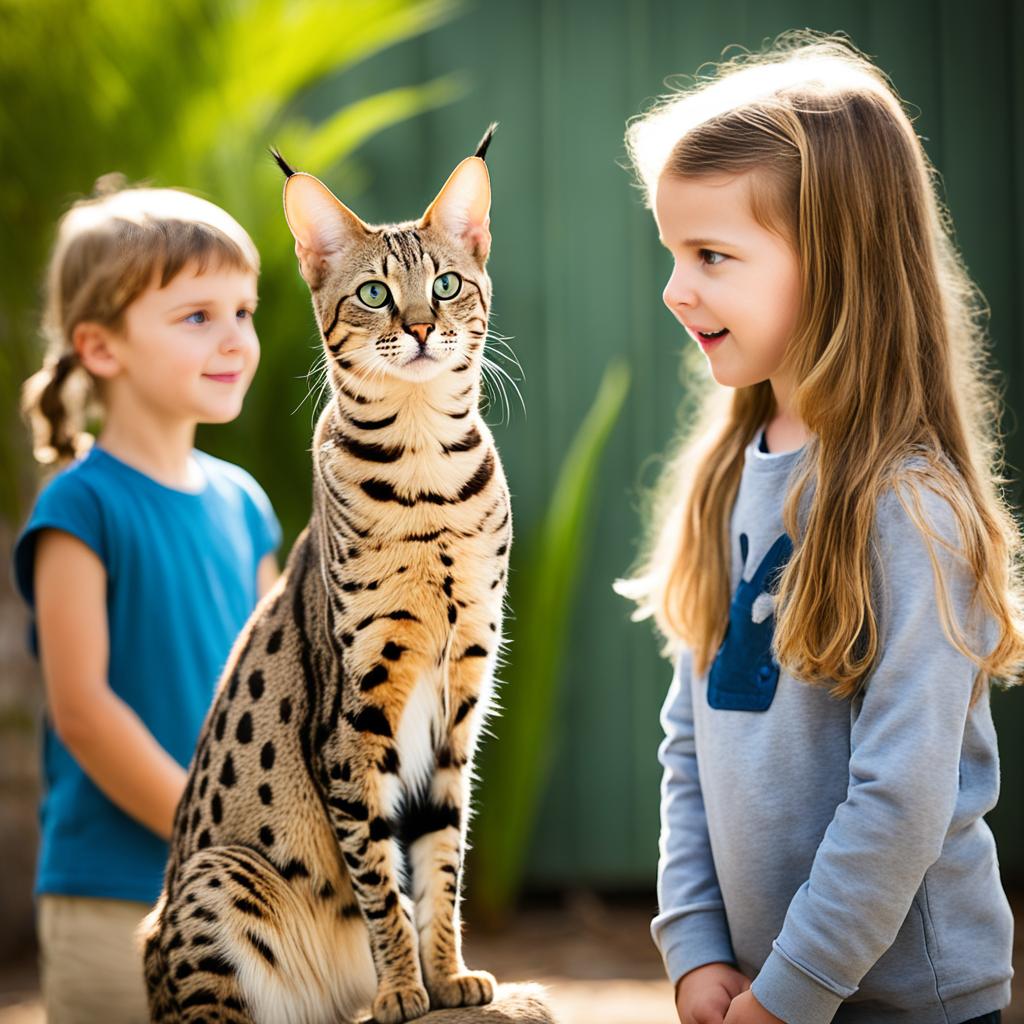
When exploring the fascinating world of Savannah Cats, it’s essential to delve into their origins, unique characteristics, and behavioral traits. These aspects define the breed and its appeal, particularly to families considering the benefits of Savannah Cats for families. From their wild heritage to their playful personalities, Savannah Cats offer a distinct feline experience.
Origins and Characteristics
Tracing the roots of Savannah Cats requires a journey back to their ancestors, the African Servals. These wild cats are known for their striking appearance and agile hunting skills. The temperament of Savannah Cats is often inherited from their Serval ancestors, giving them a combination of elegance and wild spirit. These cats typically exhibit a tall, lean physique, large ears, and striking coat patterns that set them apart from domestic breeds.
Generations: F1, F2, F3, and Beyond
The designation of Savannah Cats into generations is more than just a numerical system; it signifies their closeness to their wild heritage. F1 Savannah Cats are the first-generation offspring of an African Serval and a domestic cat, often retaining the most pronounced wild traits and requiring experienced handling. Moving beyond F1, the hybrid vigor dilutes, with F2 and F3 generations manifesting more domesticated behaviors and sometimes a more even temperament. Benefits of Savannah Cats for families with children may be more apparent in these later generations, providing a balance between exotic appearance and approachable demeanor.
Temperament and Behavior
Understanding the temperament of Savannah Cats is crucial for anyone considering them as pets. These cats are often described as energetic, curious, and highly intelligent. They tend to form strong bonds with their human families, displaying loyalty similar to that of a dog. The behavioral tendencies can vary significantly from one generation to another, with F1 Savannah Cats exhibiting more pronounced wild behaviors such as high energy levels and occasional aloofness, while later generations may be more sociable and cuddly.
Ultimately, the distinctive traits of Savannah Cats make them intriguing companions for the right households. Their striking looks, coupled with their engaging personalities, ensure they stand out, making them a breed worth considering for families seeking a unique fur friend.
Benefits of Savannah Cats for Families
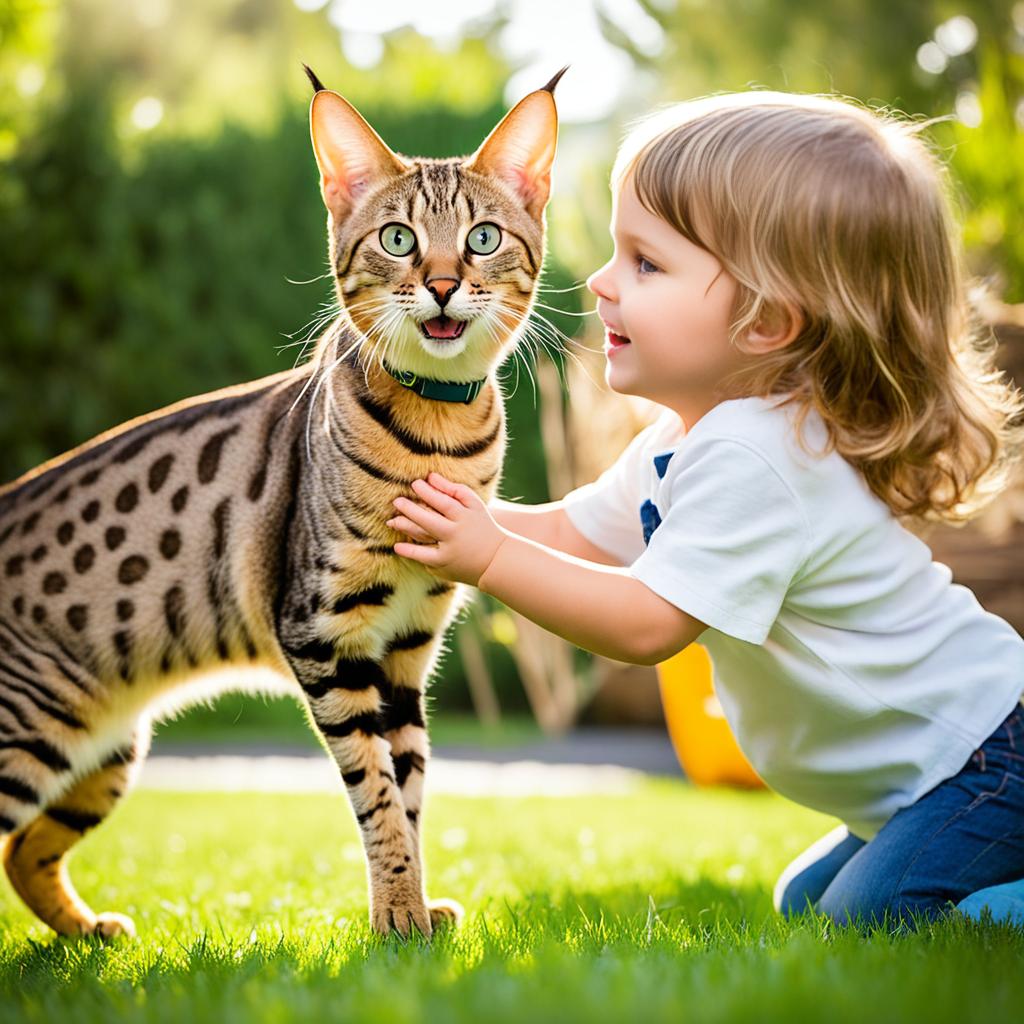
When it comes to adding a unique and engaging pet to your household, look no further than Savannah Cats as family pets. They bring a variety of wonderful traits to the table, making them well-suited for dynamic family environments.
Active Companions
Savannah Cats are known for their high energy levels and athletic nature. This makes them excellent companions for active families. Whether you have children who love to run around or family members who enjoy interactive play, Savannah Cats will keep up with everyone. Their spirited antics add a layer of fun and excitement to daily life.
Playful Personalities
The playful personalities of Savannah Cats are one of their most endearing qualities. These felines are highly intelligent and curious, often engaging in playful activities that stimulate both their minds and bodies. Their playful nature allows them to easily form bonds with family members, especially children who adore pets that are more than just couch potatoes. Given the right environment and socialization, you’ll find that Savannah Cats as family pets can turn out to be the most delightful and entertaining members of your household.
Are Savannah Cats Good with Children?
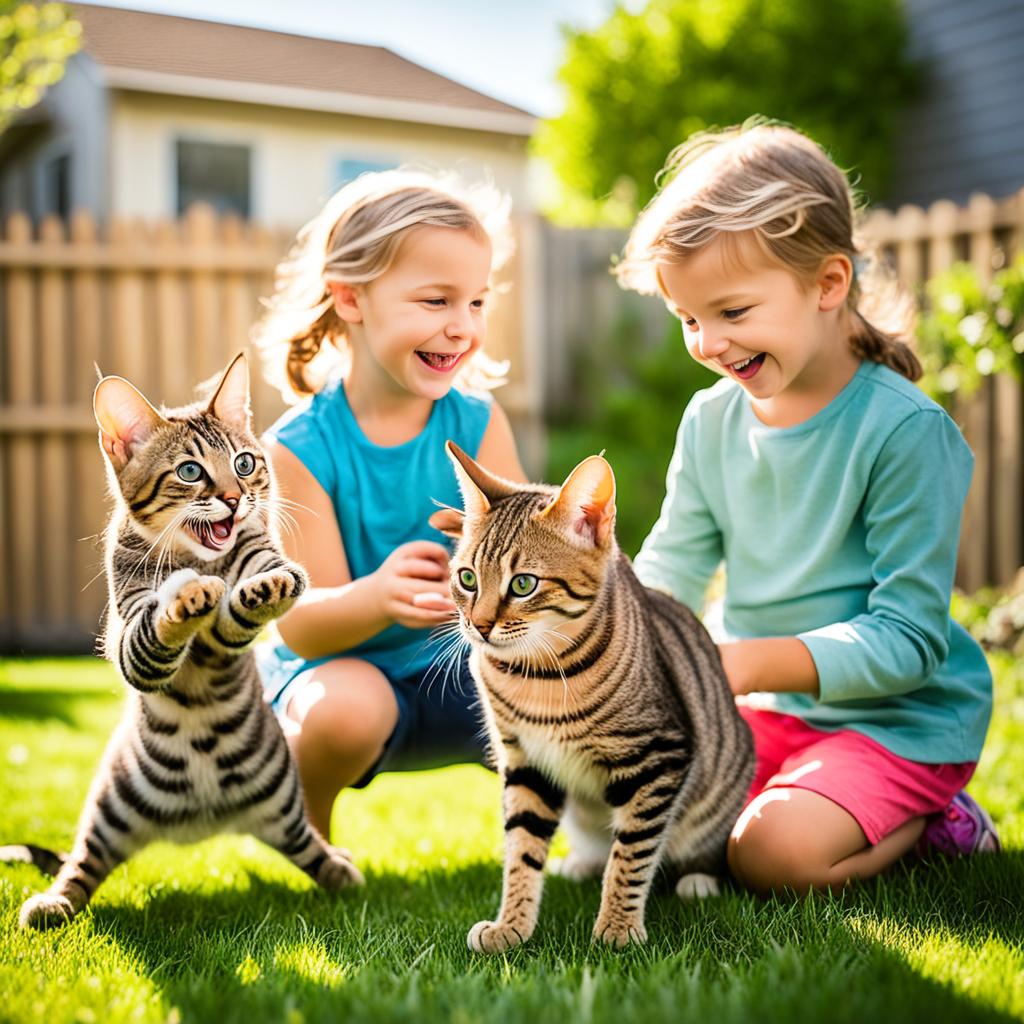
Exploring interactions between Savannah cats and children often reveals mixed feedback owing to the breed’s diverse nature. It’s crucial to differentiate between various generations to understand this dynamic better.
Observations on F1 and F2 Savannah Cats
F1 and F2 Savannah Cats tend to be more aligned with their wild heritage, displaying strong, independent personalities. These early-generation cats might not always be the most predictable around young children. That said, with the right socialization, they can still be affectionate.
Experiences with F3 Savannah Cats
F3 Savannah Cats, on the other hand, often blend better into family settings. They might form closer bonds with family members and show more welcoming behavior towards visitors. Observing interactions between Savannah cats and children, especially with F3s, reveals that these cats can indeed be wonderful companions if raised in a nurturing environment!
Here’s a helpful comparison between different generations:
| Generation | Tendency | Bond with Children |
|---|---|---|
| F1 | Wild | Challenging |
| F2 | Less Wild | Moderate |
| F3 | More Domesticated | Positive |
Interactions Between Savannah Cats and Children

Encouraging positive interactions between Savannah Cats and children is essential for a happy family dynamic. When kids and cats play together safely, strong, lasting connections can form.
Safe Playtime
Supervised playtime ensures that children can have fun with Savannah Cats without any mishaps. Given their energetic personalities, it’s crucial to establish ground rules for both your kids and your feline companion. This involves teaching your children how to approach and handle the cat gently, and recognizing signs when your cat wants some alone time. Supervised play sessions not only help in safely raising Savannah Cats with kids but also prevent any unintentional roughhousing that could stress the cat or harm the child.
Building Bonds
Building bonds with Savannah Cats involves more than just play; it’s about fostering an emotional connection. Kids can engage in activities like feeding the cat, grooming, and even training them in simple commands. This routine interaction helps in establishing trust and deepening the bond over time. Regular and positive encounters contribute significantly to building bonds with Savannah Cats, making them feel more integrated into the family.
With the right approach to safekeeping and interactive play, your household can enjoy a harmonious relationship between children and their Savannah Cats, paving the way for lasting memories and a happy home environment.
| Aspect | Key Points |
|---|---|
| Supervised Play | Ensures safety and prevents mishaps |
| Gentle Handling | Teaches respect for the cat’s space |
| Routine Interaction | Includes feeding, grooming, and training |
| Emotional Connection | Fosters trust and deeper bonds |
Age Recommendations for Children
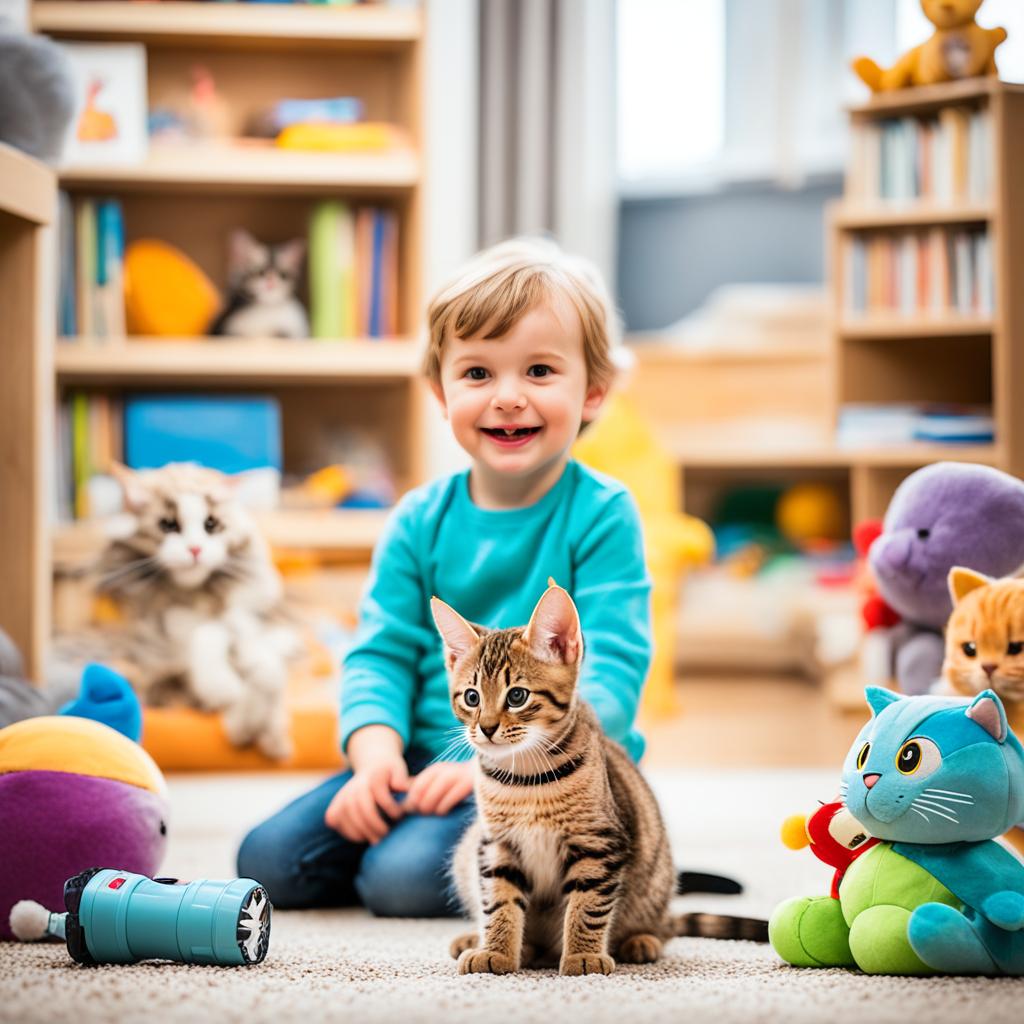
Determining the best age for children to interact with Savannah Cats is essential for a harmonious household. While these exotic felines can be delightful companions, it’s important to consider the age and maturity of your children.
Young Kids and Savannah Kittens
When it comes to young kids, Savannah Kittens might not be the best pets for kids under a certain age. Energetic and playful, kittens require gentle handling and understanding, which may be challenging for toddlers. It’s a good idea to closely supervise interactions and teach your children how to approach and play with them safely.
Older Children and Savannah Cats
Older children tend to be better suited for bonding with Savannah Cats. They can handle the playful nature and occasional mischief that comes with these cats. Older kids often find joy in activities like fetch and agility exercises, ensuring both parties stay entertained. Following these tips for introducing Savannah Cats to children can help create a positive and lasting friendship.
Ultimately, careful consideration of the age and temperament of both the children and the Savannah Cats will help determine if they are indeed the best pets for kids in your household.
Tips for Introducing Savannah Cats to Children

Bringing a Savannah Cat into a family with kids can be a rewarding experience, but it also requires meticulous planning. From the initial introductions to building long-lasting trust, understanding the nuances of these unique felines is essential.
First Meetings
The first meetings between Savannah Cats and children should be calm and controlled. Choose a quiet room where your Savannah Cat feels safe, and ensure the atmosphere is mellow to avoid overstimulation. Allow the cat to approach the children at its own pace, fostering a sense of security. It’s crucial to guide the kids on how to behave around their new pet, emphasizing gentle touches and avoiding sudden movements.
Developing Trust
Developing trust with Savannah Cats takes time and patience. Encourage daily interaction through play and feeding routines to build positive associations. Use toys that allow for distance play, giving the cat control over the interaction. Consistency and positive reinforcement are key in making your Savannah Cat feel at home. Remember, mutual trust will form the foundation for a harmonious relationship between your kids and their feline friend.
Safely Raising Savannah Cats with Kids
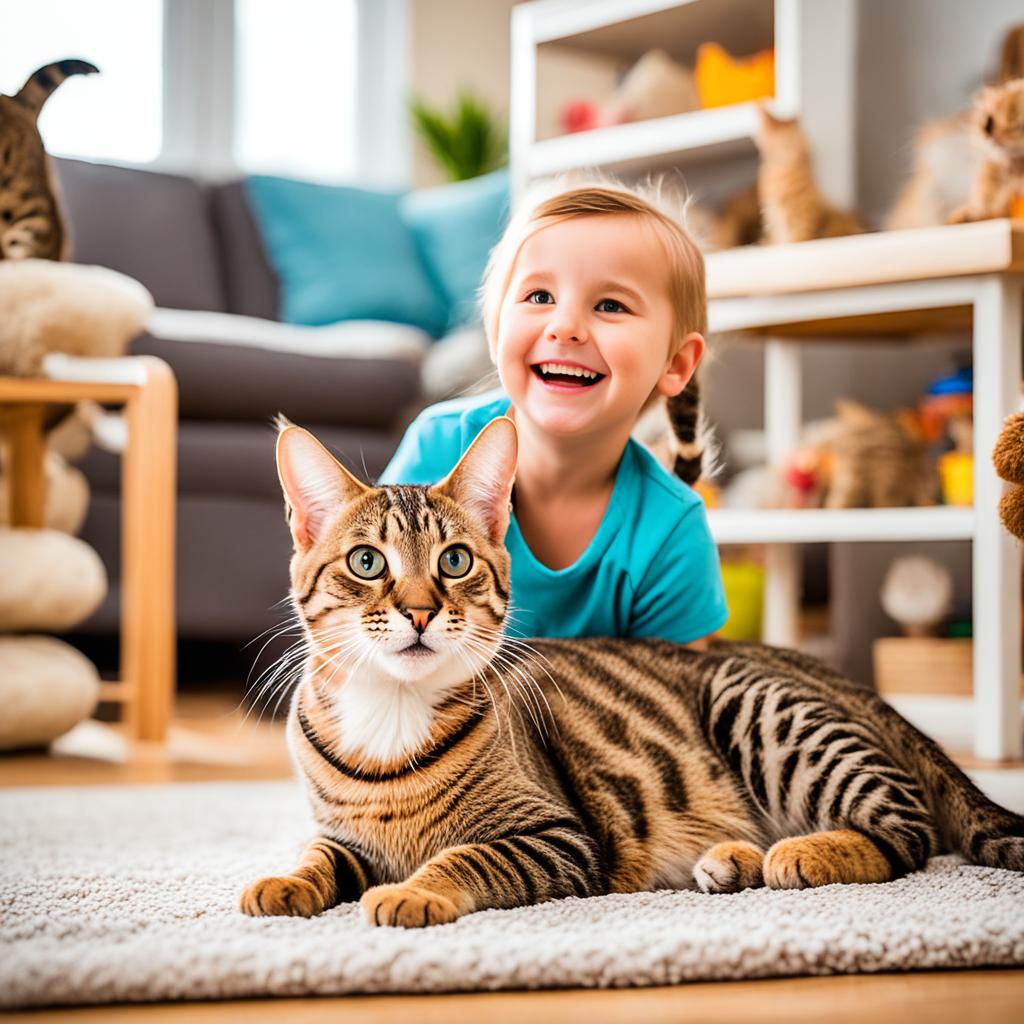
When it comes to safely raising Savannah Cats with kids, understanding your feline’s nature is key. The blend of their wild ancestry and domestic traits demands a thoughtful approach to ensure harmonious living.
Supervised Interactions
One vital practice in safely raising Savannah Cats with kids is to always supervise their interactions. This not only prevents potential mishaps but also helps the cat acclimate to their human companions. Structured playtimes and engaging activities can be beneficial for both the cat and children.
Understanding Cat Behavior
Another cornerstone in safely raising Savannah Cats with kids is to have a deep understanding of Savannah cat behavior. These cats can be fiercely independent and sometimes display strong instincts. Knowing when your cat needs space or when they’re in a playful mood is crucial. This ensures that the environment remains safe and enjoyable for everyone involved.
| Method | Benefit |
|---|---|
| Supervised Play | Ensures safety for both kids and cats |
| Understanding Behavior | Promotes harmonious living and well-being |
By focusing on supervised interactions and a robust understanding of feline behavior, you can create a nurturing environment for both your Savannah Cat and children. These majestic felines, when properly understood and managed, can make a delightful addition to the family.
Managing Common Behavioral Issues
Dealing with the behavioral quirks of Savannah Cats can be a challenge, especially when it comes to managing common behavioral issues. Their wild ancestry often adds an unpredictable edge to their demeanor. But fear not—there are effective ways to address such issues and create a harmonious environment for both your family and your feline friend.
Addressing Aggressiveness
Aggressiveness can be a significant concern when raising Savannah Cats, particularly those from early generations (F1, F2). Addressing aggressiveness in Savannah Cats requires understanding the triggers and providing appropriate outlets for their energy. Ensure they have enough stimulation through interactive toys and regular play sessions. Consistent training, positive reinforcement, and creating a safe space for your cat can go a long way in curbing aggressive tendencies.
Minimizing Biting and Scratching
Biting and scratching can often stem from Savannah Cats’ natural instincts and high energy levels. Minimizing these behaviors involves setting clear boundaries and providing plenty of scratching posts and bite toys. Encourage positive interactions with children and other pets by always supervising initial encounters and teaching them how to appropriately engage with the cat. It’s vital to be patient and to continuously apply the corrective techniques suited specifically for Savannah Cats to align their behavior with household norms.
FAQ
Are Savannah Cats good with children?
Savannah Cats can be good with children, particularly the later generations (F3 and beyond), which are known for being more domesticated and sociable. Early generations (F1 and F2) may display more wild behavior and require careful supervision.
What are the benefits of having Savannah Cats for families?
Savannah Cats are energetic, playful, and can serve as engaging companions for children. Their active nature can fit well with a family’s dynamic, especially if you’re looking for a pet that can keep up with an adventurous household.
Can Savannah Cats and children develop emotional bonds?
Yes, with the right socialization and environment, Savannah Cats can form deep emotional connections with their human family members, including children. Supervised interactions and understanding feline behavior are key to fostering these bonds.
What is the optimal age for children to interact with Savannah Cats?
Savannah Kittens can be introduced to young kids, but older children (ages 7 and up) may better handle their playful nature and high energy levels. Each family should assess their child’s readiness for such an active pet.
How can we safely raise Savannah Cats with kids?
Supervised interactions are crucial. Educate your family about the cat’s natural instincts and signals, and ensure children understand how to respect the feline’s space and needs.
What should we consider when introducing Savannah Cats to children?
Start with creating a trustworthy environment. Initial meetings should be calm and controlled. Allow the cat and the children to get used to each other’s presence gradually while monitoring their interactions.
What are some common behavioral issues with Savannah Cats?
Common issues include aggression, biting, and scratching. These behaviors can be managed with consistent training, understanding the cat’s background, and using appropriate correction techniques tailored to the unique nature of Savannah Cats.
How do I address aggressiveness in my Savannah Cat?
Addressing aggression involves identifying triggers, providing ample physical and mental stimulation, and using positive reinforcement to encourage good behavior. Consulting with a professional trainer may also be beneficial.
Do Savannah Cats require a lot of activity and play?
Absolutely! Savannah Cats are highly active and thrive on lots of play and physical activity. Engaging them in interactive playtime can be a great way for kids to bond with their Savannah Cat.
What’s the best way to introduce a Savannah Cat to a child?
Introduce them in a controlled environment and always supervise the initial interactions. Encourage gentle behavior from both the child and the cat, and give the cat time to get comfortable in its new surroundings.




